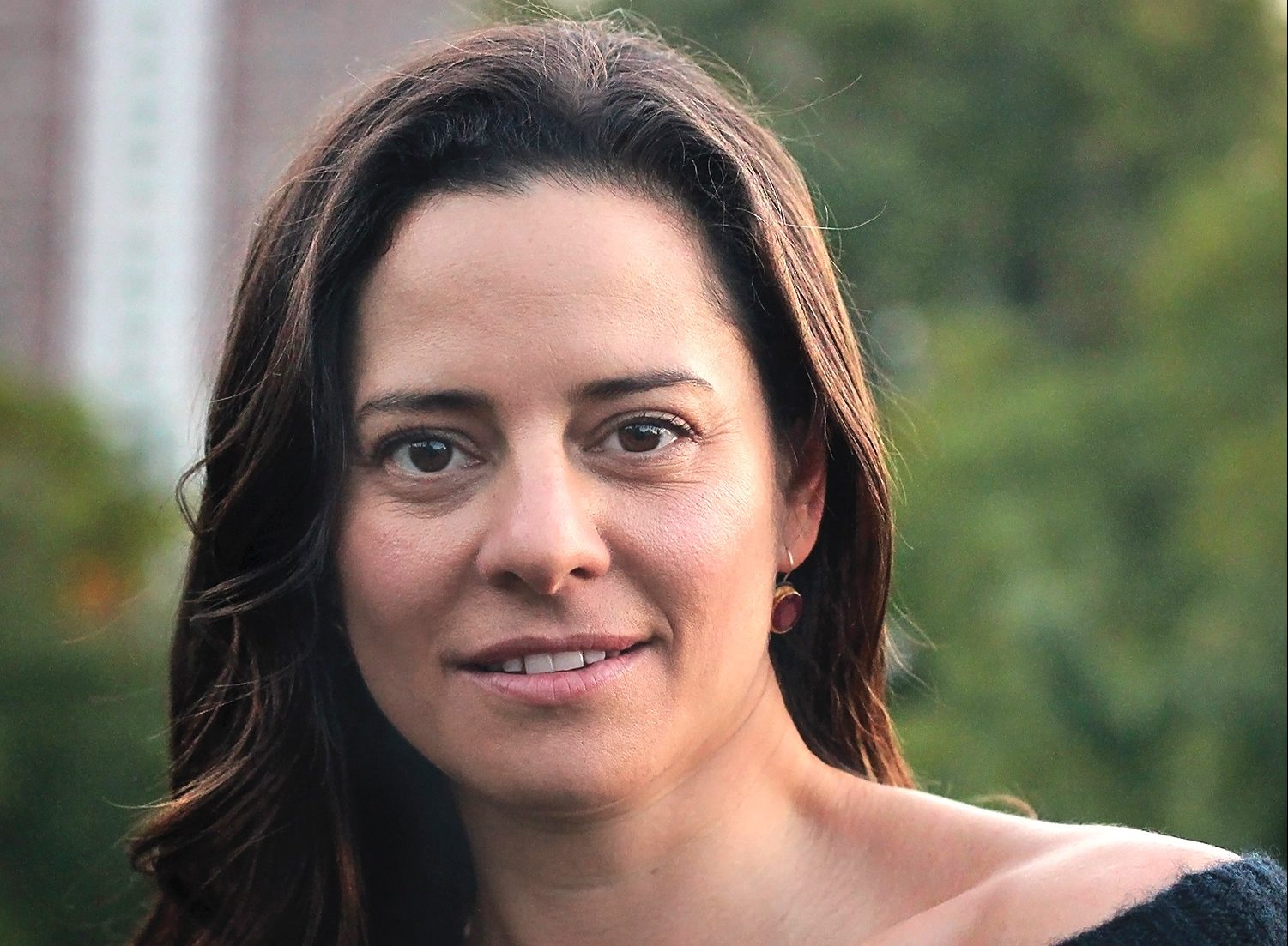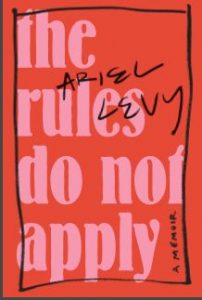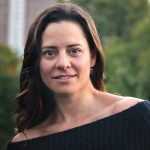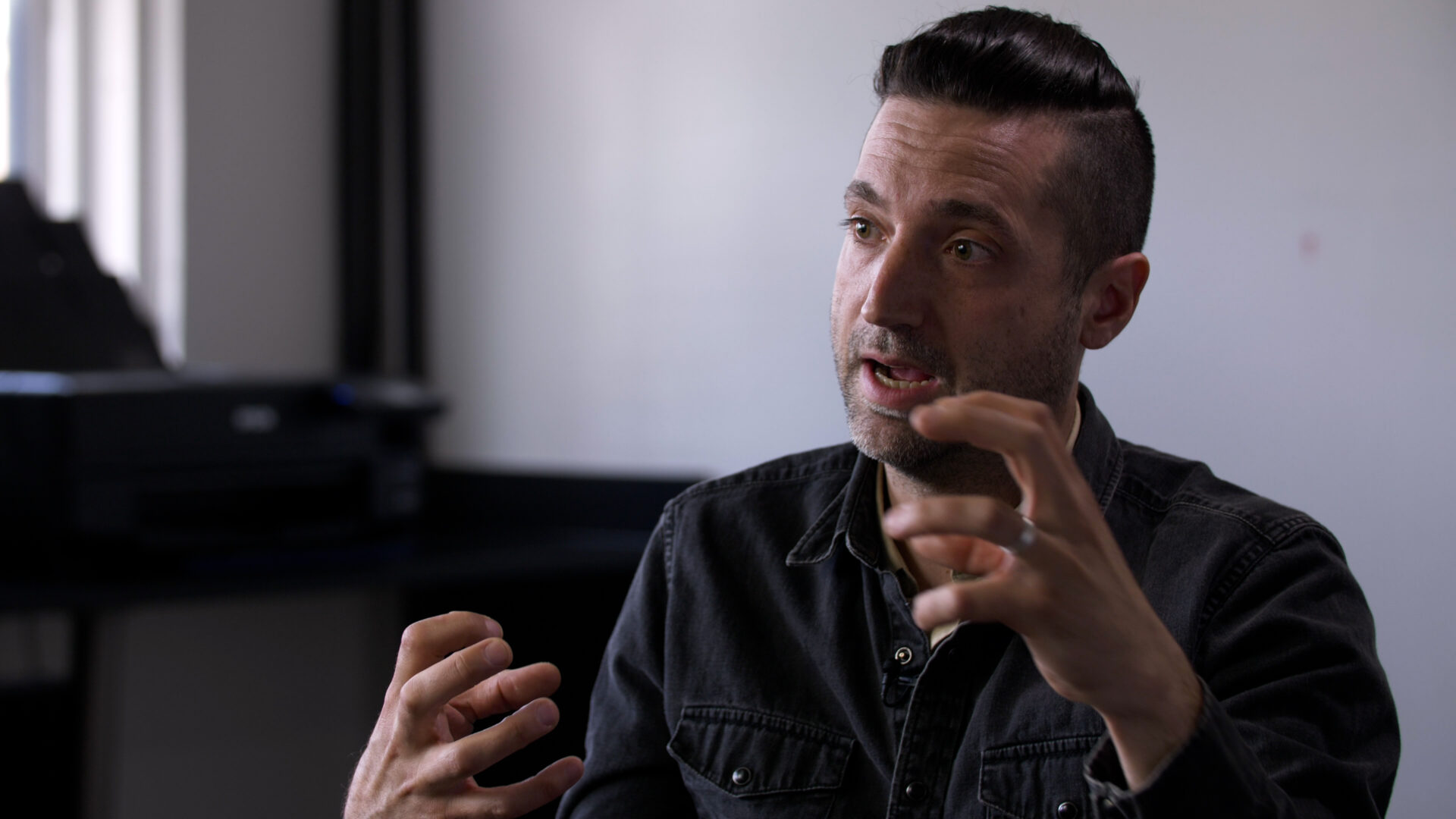BOOK EXCERPT: THE RULES DO NOT APPLY, BY ARIEL LEVY ’96

An excerpt from The Rules Do Not Apply, by Ariel Levy ’96, based on “Thanksgiving in Mongolia,” by Ariel Levy, which originally appeared in The New Yorker in 2013.
 An excerpt from The Rules Do Not Apply, by Ariel Levy, published in the United States by Random House, an imprint and division of Penguin Random House, LLC, New York. Copyright © 2017 by Ariel Levy, Inc. This work is based on “Thanksgiving in Mongolia,” by Ariel Levy, which originally appeared in The New Yorker in 2013.
An excerpt from The Rules Do Not Apply, by Ariel Levy, published in the United States by Random House, an imprint and division of Penguin Random House, LLC, New York. Copyright © 2017 by Ariel Levy, Inc. This work is based on “Thanksgiving in Mongolia,” by Ariel Levy, which originally appeared in The New Yorker in 2013.
My favorite game when I was a child was Mummy and Explorer. My father and I would trade off roles: One of us had to lie very still with eyes closed and arms crossed over the chest, and the other had to complain, “I’ve been searching these pyramids for so many years—when will I ever find the tomb of Tutankhamun?” (This was in the late seventies when Tut was at the Met, and we came in from the suburbs to visit him frequently.) At the climax of the game, the explorer stumbles on the embalmed Pharaoh and—brace yourself—the mummy opens his eyes and comes to life. The explorer has to express shock, and then say, “So, what’s new?” To which the mummy replies, “You.” I was not big on playing house. I preferred make-believe that revolved around adventure, starring pirates and knights. I was also domineering, impatient, relentlessly verbal, and, as an only child, often baffled by the mores of other kids. I was not a popular little girl. I played Robinson Crusoe in a small wooden fort my parents built from a kit in the backyard, where I sorted through the acorns and onion grass I gathered for sustenance. In the fort, I was neither ostracized nor ill at ease—I was self-reliant, brave, ingeniously surviving, if lost.
Books are the other natural habitat for a child who loves words and adventures, and I was content when my parents read me Moby-Dick, Pippi Longstocking, or The Hobbit. I decided early that I would be a writer when I grew up. That, I thought, was the profession that went with the kind of woman I wanted to become: one who is free to do whatever she chooses.
I started keeping a diary in the third grade and, in solidarity with Anne Frank, I named it and personified it and made it my confidante. “The point that prompted me to keep a diary in the first place: I don’t have a friend,” Frank told Kitty, her journal. Writing is communicating with an unknown intimate who is always available, the way the faithful can turn to God. My lined notebooks were the only place I could say as much as I wanted, whenever I wanted. To this day I feel comforted and relieved of loneliness, no matter how foreign my surroundings, if I have a pad and a pen.
As a journalist, I’ve spent nearly two decades putting myself in foreign surroundings as frequently as possible. There is nothing I love more than traveling to a place where I know nobody, and where everything will be a surprise, and then writing about it. It’s like having a new lover—even the parts you aren’t crazy about have the crackling fascination of the unfamiliar.
The first story I ever published was about another world only an hour from my apartment. I was twenty-two, living in the East Village in a sixth-floor walk-up with a roommate and roaches, working as an assistant at New York magazine. My friend Mayita was an intern in the photo department who knew about a nightclub for obese women in Queens. We talked about it during our lunch break, when we were walking around midtown Manhattan with our plastic containers of limp salad, dreading going back to the office.
I was not a key member of the staff. It was my job to take the articles the writers faxed over and type them into the computer system—it was 1996, email was still viewed as a curious phenomenon that might blow over. Also, I had to input the crossword puzzle by looking back and forth between the paper the puzzle-crafter sent me and my computer screen, trying to remember if it went black, black, white, black, or black, white, black, black. I was in a constant state of embittered self-righteousness at the office. How had I been mistaken for a charwoman? Mayita was similarly horrified by the tumble her status had taken: As a senior at Wesleyan just a few months before, she had been the next Sally Mann. Now she alphabetized negatives all day. (When we expressed subdued versions of our outrage to our elders, their responses invariably included the phrase “paying your dues.” It was not a phrase we cared for.)
We decided not to wait for someone at the office to give us permission to do what we really wanted. We took the subway about a million stops into Queens and went to a cavernous bar in Rego Park where women who weighed hundreds of pounds went to dance and flirt with their admirers and have lingerie pageants at four in the morning. It was very dark in there. The air smelled stagnant and sweaty and the drinks were so strong they fumed. But the women were magnificent, like enormous birds: feathery false eyelashes fluttering, tight, shiny dresses in peacock blue and canary yellow, the dim light reflecting off their sequins. Mayita and I stood out. We were puny, dressed in jeans and drab sweaters, little pigeons. It was scary, but electrifying: What we’re writing is more important than your anxiety and humiliation, my competent self told me. So I went up to complete strangers with my notepad, and asked them to tell me their stories.
And they did. They told me about being fat little girls, or about how they got fat after they had children. They said they were sick of being ashamed, sick of apologizing for taking up so much space, so they’d come to believe that big was beautiful (or at least they’d come to believe it some of the time). They had passionate admirers, but it was difficult because they could never be sure if the men they dated—the “chubby chasers”—loved them for themselves, or for their fat. For their fat! I marveled on the way back to my apartment from the subway at 5 a.m. in the fading darkness.
The Manhattan around me in the late nineties was glossy, greedy, hard. The slim women on Madison Avenue, on television, with their clicking heels and ironed-straight hair, gripped thousand-dollar handbags covered with interlocking G’s. The restaurants people wanted to get into were sleek and ferociously expensive—nobody talked about farm to table; nobody wanted to see rough-hewn reclaimed wood. It was the genesis of Internet culture, and people my age kept making enormous sums of money on start-ups, on all sorts of things. A friend at work optioned the first big article she published at the magazine to a producer for half a million dollars when she was only twenty-five. (It was about the rich young publicists who maintained the city’s nocturnal hierarchy, wielding their guest lists and their gift bags. “Most of us have as much power as older guys in suits,” one of them said. “And soon enough we’ll have more.”)
There was no undercurrent of fear, very little pull against the prevailing tide of self-interest at that time. My generation had never experienced a real, prolonged war. Nobody thought about terrorism. Even climate change still seemed like something that could be safely ignored until the distant future—perhaps we would prevent it by recycling our soda cans. There was an unapologetic ethos of consumption in New York City, which the magazine I worked for both satirized and promoted. I found it alluring and alienating by turns.
So to locate an underworld of women who simply opted out of that slick culture, whose very bodies were unmistakable monuments of resistance, was thrilling. As I wrote my story (which turned out to be a lot harder than I’d imagined it would), I felt I was describing an exotic universe with its own aesthetic and manners, but even more, I was writing about an unconventional kind of female life. What does it mean to be a woman? What are the rules? What are your options and encumbrances? I wanted to tell stories that answered, or at least asked, those questions.
I was giddy when an editor at the magazine said that they would publish my article and Mayita’s photos, and pay us for them. (They gave the story what is still the best headline I’ve ever had: WOMEN’S LB.) That article fee was special money, magic money—a reward for doing something that was its own reward. It was also two thousand dollars, which was more than my monthly take-home pay. Usually, it was a stretch to cover the cost of subway tokens and the rent on my grimy, depressing apartment. But after I got paid for my story, I went to the fancy salad bar at lunchtime for weeks. I took heedless scoops of the beets with blood-orange segments; I piled sliced steak next to them with abandon.
Writing was the solution to every problem—financial, emotional, intellectual. It had kept me company when I was a lonely child. It gave me an excuse to go places I would otherwise be unlikely to venture. It satisfied the edict my mother had issued many times throughout my life: “You have to make your own living; you never want to be dependent on a man.” And it made me feel good, like there was a reason for me. “It is a very strange thing that people will give you a motor car if you will tell them a story,” Virginia Woolf said in an address to the National Society for Women’s Service, a group of female professionals, in 1931. “It is a still stranger thing that there is nothing so delightful in the world as telling stories.”
I’d been promoted to staff writer by the time I fell in love, when I was twenty-eight. I got married a few years later—we all did. As we reached our thirtieth birthdays, my friends and I were like kernels of popcorn exploding in a pot: First one, then another, and pretty soon we were all bursting into matrimony. There were several years of peace, but then the pregnancies started popping. I found this unsettling.
To become a mother, I feared, was to relinquish your status as the protagonist of your own life. Your questions were answered, your freedom was gone, your path would calcify in front of you. And yet it still pulled at me. Being a professional explorer would become largely impossible if I had a child, but having a kid seemed in many ways like the wildest possible trip. Sometimes, on the long flights I took for my stories, I would listen to “Beginning of a Great Adventure,” a Lou Reed song about impending parenthood: “A little me or he or she to fill up with my dreams,” he sings. “A way of saying life is not a loss.” As my friends, one after the next, made the journey from young woman to mother, it glared at me that I had not.
Some of my friends were outraged to discover that reproduction was not necessarily a simple mission. Can you believe I’m still not pregnant? they would ask, embittered, distraught, as their sex lives became suffused by grim determination, and they endured inseminations, in vitro, hormone injections, humiliation. I’ve been trying for a year . . . two . . . five. I’ve spent six thousand dollars on these doc- tors . . . eight thousand . . . forty thousand.
I listened to them. I said things that I hoped sounded comforting. But the thought in my head was always, Of course. It wasn’t as though the research had just come in: Fertility wanes as the years accrue. We all knew this to be true. But somehow we imagined we could get around it.
We lived in a world where we had control of so much. If we didn’t want to carry groceries up the steps, we ordered them online and waited in our sweatpants on the fourth floor for a man from Asia or Latin America to come panting up, encumbered with our cat litter and organic bananas. If we wanted to communicate with one another when we were on opposite ends of the earth, we picked up devices that didn’t exist when we were young and sent each other texts, emails, pictures we’d taken seconds earlier without any film. Anything seemed possible if you had ingenuity, money, and tenacity. But the body doesn’t play by those rules.
We were raised to think we could do what we wanted—we were free to be you and me! And many of our parents’ revolutionary dreams had actually come true. A black man really could be president. It was sort of okay to be gay—gay married, even. You could be female and have an engrossing career and you didn’t have to be a wife or mother (although, let’s face it, it still seemed advisable: Spinsterhood never exactly lost its taint). Sometimes our parents were dazzled by the sense of possibility they’d bestowed upon us. Other times, they were aghast to recognize their own entitlement, staring back at them magnified in the mirror of their offspring.
Daring to think that the rules do not apply is the mark of a visionary. It’s also a symptom of narcissism.
I always get terrified before I travel. I become convinced that this time I won’t be able to figure out the map, or communicate with non-English-speakers, or find the people I need in order to write the story I’ve been sent in search of. I will be lost and incompetent and vulnerable.
So it was with childbearing: I was afraid for almost a decade. I didn’t like childhood, and I was afraid that I’d have a child who didn’t, either. I was afraid I would be an awful mother. And I was afraid of being grounded, sessile—stuck in one spot for twenty years of oboe lessons and math homework that I hadn’t been able to finish the first time around.
I paid attention to what I saw and read on the subject. “A child, yes, is a vortex of anxieties,” Elena Ferrante wrote in her novel The Lost Daughter. Her protagonist eventually rips herself away from her children, and enters an experience of the sublime: “Everything starting from zero. No habit, no sensations dulled by predictability. I was I, I produced thoughts not distracted by any concern other than the tangled thread of dreams and desires.” If you held a baby all night and day, your hands would not be free to cling to that tangled thread.
I once saw an interview with Joni Mitchell in which she explained why she didn’t marry Graham Nash and have his babies when they were a couple in the sixties. She turned her back on the domestic dream she had inspired him to canonize: “I’ll light the fire, you place the flowers in the vase.” After he proposed, Mitchell found herself thinking about her grandmother, a frustrated musician who felt so trapped by motherhood and women’s work that one afternoon she “kicked the kitchen door off the hinges.” Her life would not be about self-expression. She resigned herself to her reality.
Mitchell thought that she would end up like her grandmother if she chose family and domesticity. So instead, as she sang in “Don Juan’s Reckless Daughter,” she went roaming, “out on the vast and subtle plains of mystery.”
I wanted to meet those mysteries, too. I wanted to feel the limitless Mongolian steppe spread out in front of me. I wanted to know what it smells like in the morning in Rajasthan. Why? “I want to do it because I want to do it,” Amelia Earhart once wrote in a letter to her husband. “Women must try to do things as men have tried.”
I would not kick the door off its hinges. I would not choose the muffling comforts of home. I would be the explorer, not the mummy.
 Ariel Levy is a staff writer at The New Yorker magazine. She was the editor of The Best American Essays 2015. Her personal story “Thanksgiving in Mongolia” won a National Magazine Award for Essays and Criticism, and it is the basis for The Rules Do Not Apply.
Ariel Levy is a staff writer at The New Yorker magazine. She was the editor of The Best American Essays 2015. Her personal story “Thanksgiving in Mongolia” won a National Magazine Award for Essays and Criticism, and it is the basis for The Rules Do Not Apply.

